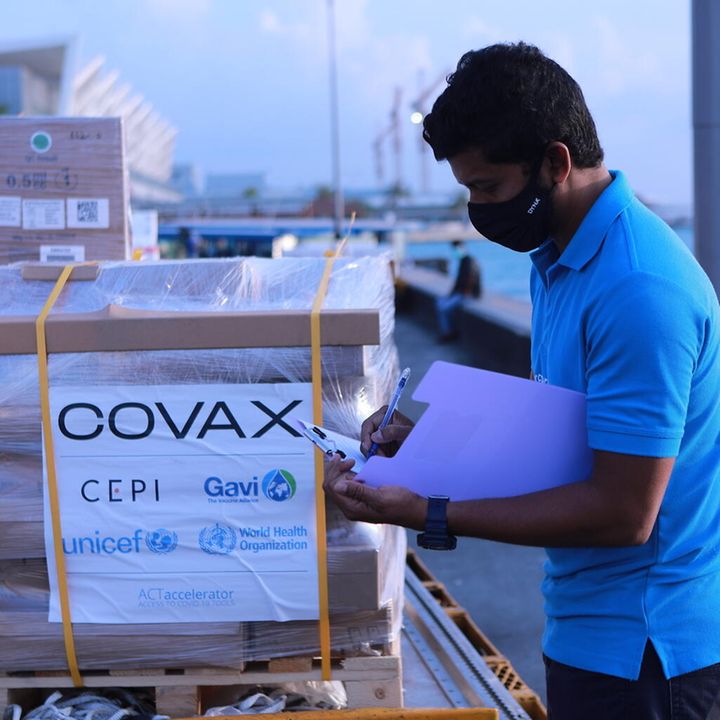
COVAX-Initiative
Wer Impfen will, braucht
Wer impfen möchte braucht Spritzen. UNICEF hat innerhalb der COVAX Initiative der WHO die Rolle übernommen Spritzen bereitzustellen. Der Clou, es handelt sich um Modelle die sich nach der Verwendung selbst zerstören und damit die Gefahren der mehrfachen Verwendung von vornherein vermeiden. Die erste Lieferung in die Malediven ist auf dem Weg weitere Länder werden folgen.
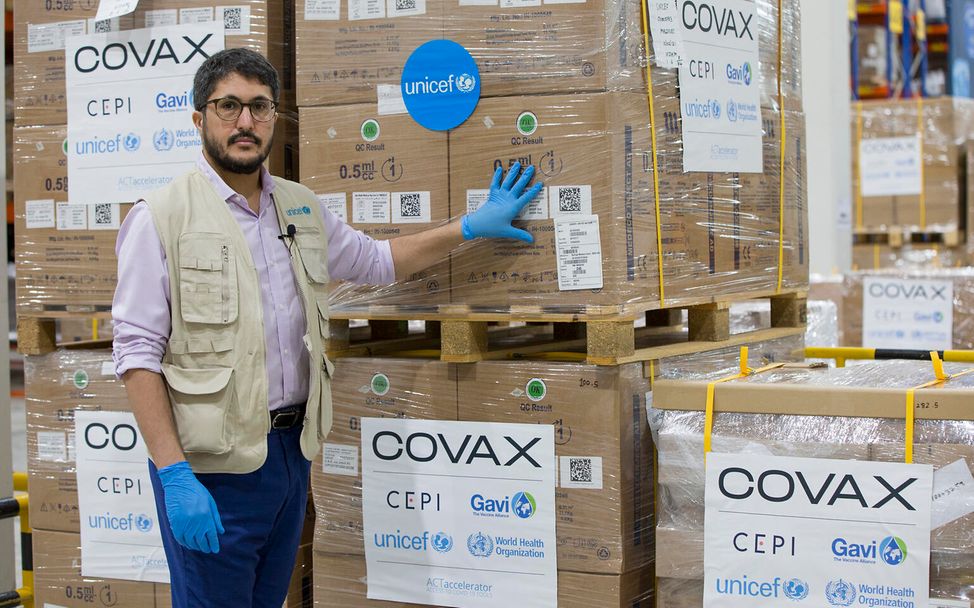
Bild 1 von 7 | On 21 February 2021, UNICEF staff Rafik ElOuerchefani is photographed next to pallets of auto-disable syringes at a warehouse in Dubai Logistics City, United Arab Emirates.
In all, UNICEF will be supplying up to 1 billion syringes and 10 million safety boxes to countries in 2021 to ensure they are ready for COVID-19 vaccinations. In order to meet the demand for these vital supplies, UNICEF created a stockpile of almost half a billion syringes in its warehouses in Copenhagen and Dubai in preparation for the broader rollout of COVID-19 vaccines in 82 low- and lower middle-income countries. These shipments will support the country rollout of COVID-19 vaccines, and is part of work by the COVAX Facility to provide vaccines to low- and lower middle-income countries. The 0.5 ml syringes are being dispatched from UNICEF’s humanitarian warehouse in Dubai, while the 0.3 ml & 2 ml syringes will be transported directly from a manufacturer in Spain. The consignments will also include safety boxes for the safe disposal of syringes. Both syringes are of the auto-disable type, which means they cannot be used again after a single dose of vaccine has been administered. This reduces the risk of infection from blood-borne diseases as a result of syringe re-use.
© Copyright UNICEF 2021 / UN0419485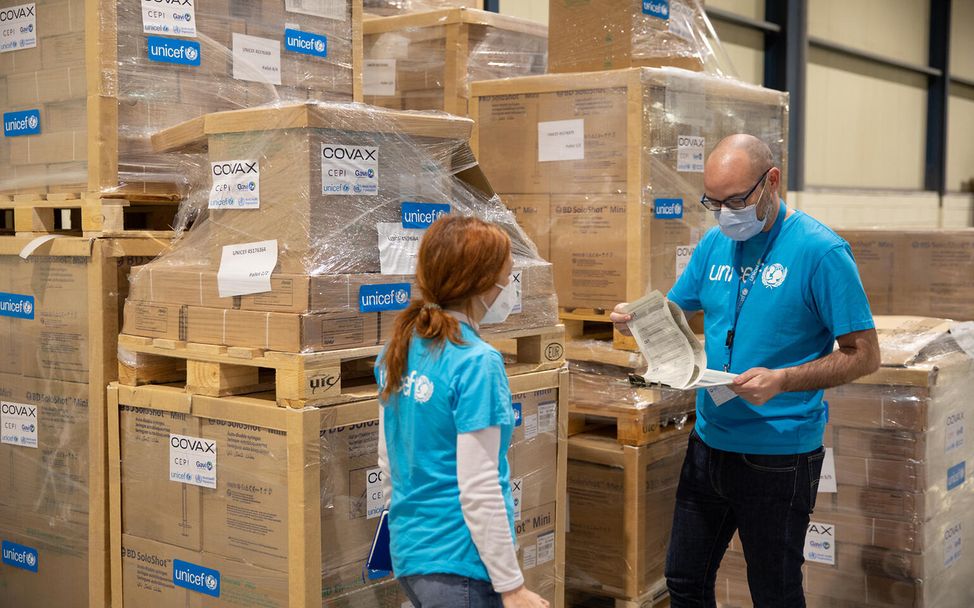
Bild 2 von 7 | Unicef staff checking boxes containing syringes which are stored the warehouse, waiting to be loaded into trucks. They are marked with UNICEF and COVAX stickers. Fraga, Spain. 22nd February 2021. ©UNICEF/Jordi Matas
In all, UNICEF will be supplying up to 1 billion syringes and 10 million safety boxes to countries in 2021 to ensure they are ready for COVID-19 vaccinations. In order to meet the demand for these vital supplies, UNICEF created a stockpile of almost half a billion syringes in its warehouses in Copenhagen and Dubai in preparation for the broader rollout of COVID-19 vaccines in 82 low- and lower middle-income countries. These shipments will support the country rollout of COVID-19 vaccines, and is part of work by the COVAX Facility to provide vaccines to low- and lower middle-income countries. The 0.5 ml syringes are being dispatched from UNICEF’s humanitarian warehouse in Dubai, while the 0.3 ml & 2 ml syringes will be transported directly from a manufacturer in Spain. The consignments will also include safety boxes for the safe disposal of syringes. Both syringes are of the auto-disable type, which means they cannot be used again after a single dose of vaccine has been administered. This reduces the risk of infection from blood-borne diseases as a result of syringe re-use.
© Copyright UNICEF 2021 / UN0420544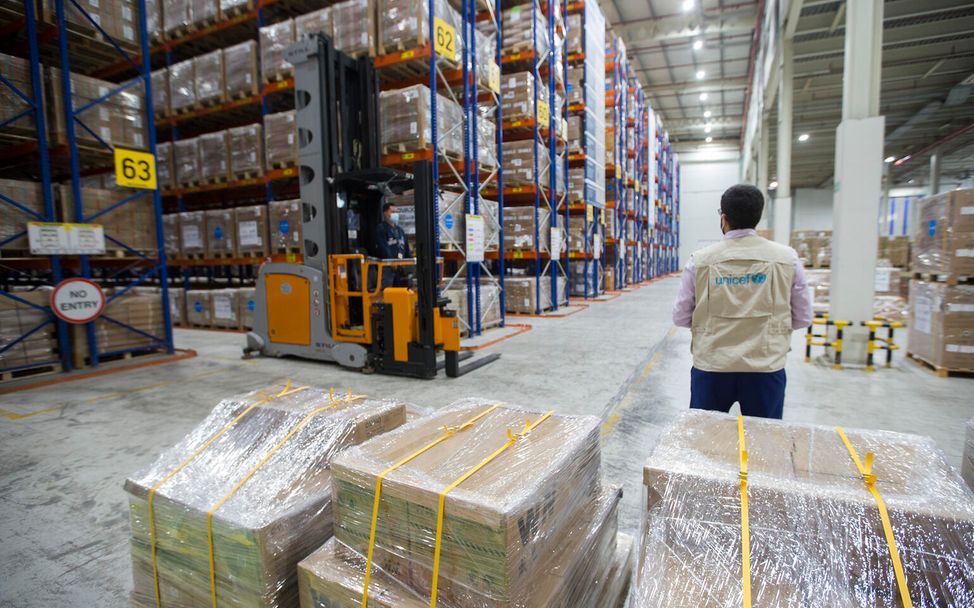
Bild 3 von 7 | In all, UNICEF will be supplying up to 1 billion syringes and 10 million safety boxes to countries in 2021 to ensure they are ready for COVID-19 vaccinations. In order to meet the demand for these vital supplies, UNICEF created a stockpile of almost half a billion syringes in its warehouses in Copenhagen and Dubai in preparation for the broader rollout of COVID-19 vaccines in 82 low- and lower middle-income countries. These shipments will support the country rollout of COVID-19 vaccines, and is part of work by the COVAX Facility to provide vaccines to low- and lower middle-income countries. The 0.5 ml syringes are being dispatched from UNICEF’s humanitarian warehouse in Dubai, while the 0.3 ml & 2 ml syringes will be transported directly from a manufacturer in Spain. The consignments will also include safety boxes for the safe disposal of syringes. Both syringes are of the auto-disable type, which means they cannot be used again after a single dose of vaccine has been administered. This reduces the risk of infection from blood-borne diseases as a result of syringe re-use.
© Copyright UNICEF 2021 / UN0419496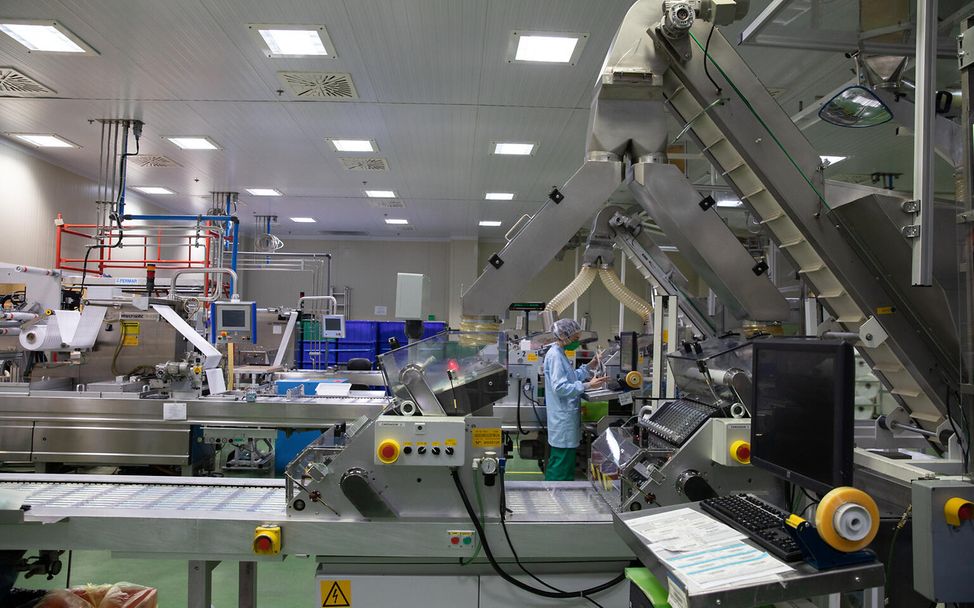
Bild 4 von 7 | Syringes are assembled and then packaged in the Clean room. The syringe is made of a barrel with an integrated needle and a plunger with a metallic clip to block the syringe after usage. Fraga, Spain. 22nd February 2021. ©UNICEF/Jordi Matas
In all, UNICEF will be supplying up to 1 billion syringes and 10 million safety boxes to countries in 2021 to ensure they are ready for COVID-19 vaccinations. In order to meet the demand for these vital supplies, UNICEF created a stockpile of almost half a billion syringes in its warehouses in Copenhagen and Dubai in preparation for the broader rollout of COVID-19 vaccines in 82 low- and lower middle-income countries. These shipments will support the country rollout of COVID-19 vaccines, and is part of work by the COVAX Facility to provide vaccines to low- and lower middle-income countries. The 0.5 ml syringes are being dispatched from UNICEFâs humanitarian warehouse in Dubai, while the 0.3 ml & 2 ml syringes will be transported directly from a manufacturer in Spain. The consignments will also include safety boxes for the safe disposal of syringes. Both syringes are of the auto-disable type, which means they cannot be used again after a single dose of vaccine has been administered. This reduces the risk of infection from blood-borne diseases as a result of syringe re-use.
© Copyright UNICEF 2021 / UN0420541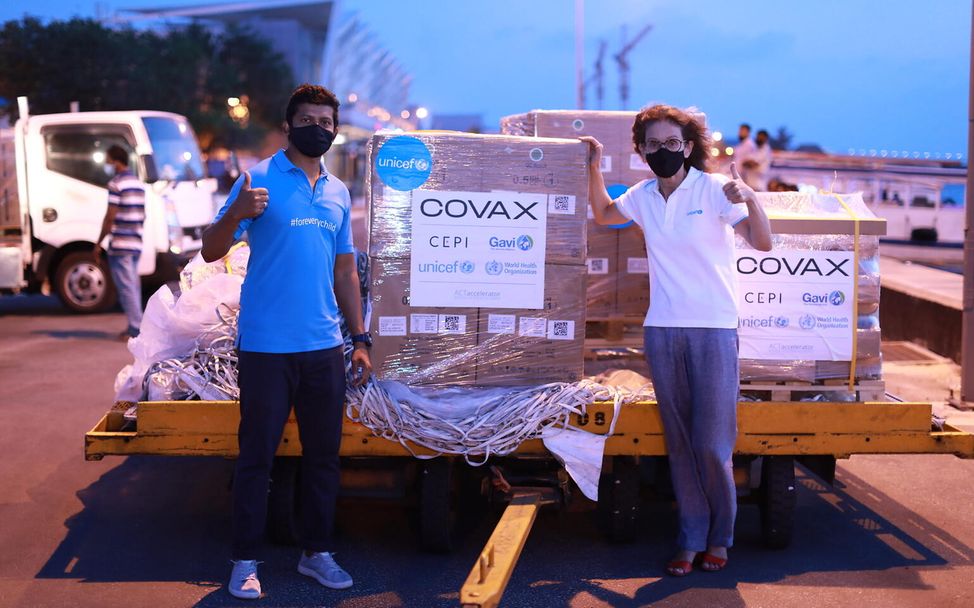
Bild 5 von 7 | In Malé, Maldives, on 23 February 2021, UNICEF Regional Emergency Advisor for South Asia Carmen van Heese and UNICEF Maldives Communications for Development Office Muhamad Yasir celebrate the 100,000 syringes and 1,000 safety boxes that have just arrived from UNICEF's humanitarian warehouse in Dubai.
The syringes are of the auto-disable type, which means they cannot be used again after a single dose of vaccine has been administered. This reduces the risk of infection from blood-borne diseases as a result of syringe re-use. The safety boxes allow for the safe disposal of used syringes. The arrival is part of the first wave of COVID-19-related syringe shipments by UNICEF on behalf of the COVAX facility. Other countries in the first wave of shipments include Côte d'Ivoire and São Tomé and Príncipe.
UNICEF is leading in the procurement and delivery of COVID-19 vaccines for 82 low- and lower middle-income countries participating in the COVAX Facility. The COVAX Facility, co-led by Gavi, the Coalition for Epidemic Preparedness Innovations (CEPI) and WHO, together with UNICEF, aims to provide at least 2 billion doses of approved COVID-19 vaccines by the end of 2021, enabling participating economies to protect frontline health care and social workers, as well as other high-risk and vulnerable groups. In all, UNICEF will be supplying up to 1 billion syringes and 10 million safety boxes to countries in 2021 to ensure they are ready for COVID-19 vaccinations. In order to meet the demand for these vital supplies, UNICEF created a stockpile of almost half a billion syringes in its warehouses in Copenhagen and Dubai in preparation for the broader rollout of COVID-19 vaccines.
© Copyright UNICEF 2021 / UN0421076
Bild 6 von 7 | In Malé, Maldives, on 23 February 2021, UNICEF Maldives Communication for Development Officer Mohamed Yasir documents the arrival of the100,000 syringes and 1,000 safety boxes shipped from from UNICEF's humanitarian warehouse in Dubai.
The syringes are of the auto-disable type, which means they cannot be used again after a single dose of vaccine has been administered. This reduces the risk of infection from blood-borne diseases as a result of syringe re-use. The safety boxes allow for the safe disposal of used syringes. The arrival is part of the first wave of COVID-19-related syringe shipments by UNICEF on behalf of the COVAX facility. Other countries in the first wave of shipments include Côte d'Ivoire and São Tomé and Príncipe.
UNICEF is leading in the procurement and delivery of COVID-19 vaccines for 82 low- and lower middle-income countries participating in the COVAX Facility. The COVAX Facility, co-led by Gavi, the Coalition for Epidemic Preparedness Innovations (CEPI) and WHO, together with UNICEF, aims to provide at least 2 billion doses of approved COVID-19 vaccines by the end of 2021, enabling participating economies to protect frontline health care and social workers, as well as other high-risk and vulnerable groups. In all, UNICEF will be supplying up to 1 billion syringes and 10 million safety boxes to countries in 2021 to ensure they are ready for COVID-19 vaccinations. In order to meet the demand for these vital supplies, UNICEF created a stockpile of almost half a billion syringes in its warehouses in Copenhagen and Dubai in preparation for the broader rollout of COVID-19 vaccines.
© Copyright UNICEF 2021 / UN0421059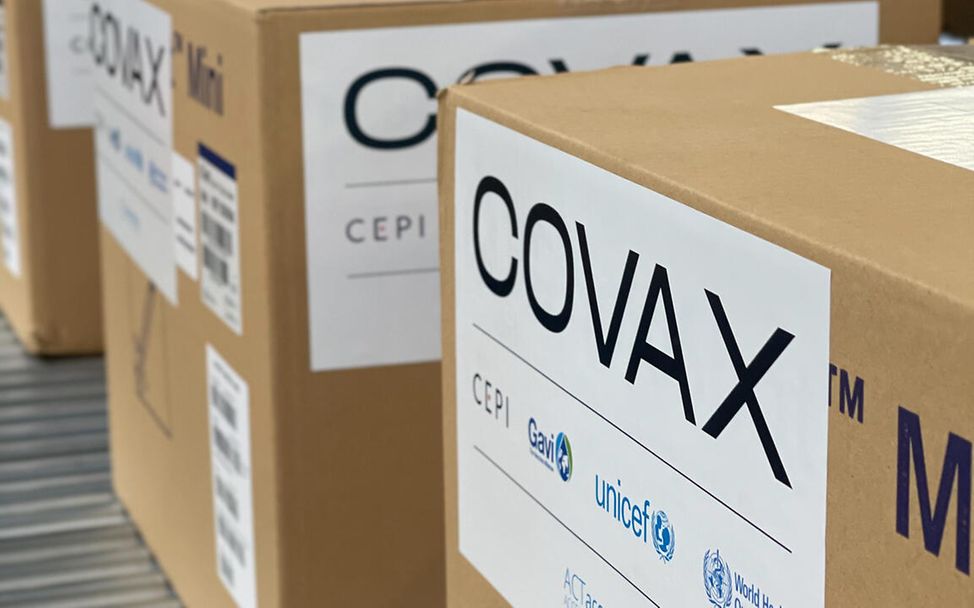
Bild 7 von 7 | On 24 February 2021, syringes are packaged and ready for distribution from UNICEFs Supply warehouse in Copenhagen, Denmark.
In all, UNICEF will be supplying up to 1 billion syringes and 10 million safety boxes to countries in 2021 to ensure they are ready for COVID-19 vaccinations. In order to meet the demand for these vital supplies, UNICEF created a stockpile of almost half a billion syringes in its warehouses in Copenhagen and Dubai in preparation for the broader rollout of COVID-19 vaccines in 82 low- and lower middle-income countries. These shipments will support the country rollout of COVID-19 vaccines, and are part of work by the COVAX Facility to provide vaccine equity for low- and lower middle-income countries. The 0.5 ml syringes are being dispatched from UNICEFs humanitarian warehouse in Dubai, while the 0.3 ml & 2 ml syringes will be transported directly from a manufacturer in Spain. The consignments will also include safety boxes for the safe disposal of syringes. Both syringes are of the auto-disable type, which means they cannot be used again after a single dose of vaccine has been administered. This reduces the risk of infection from blood-borne diseases as a result of syringe re-use.